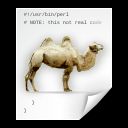Creating .lib file from verilog

Creating a dummy .lib file is something every physical design engineer has done now and then. If you have a verilog model of the block available, your task gets easier. The following script automates .lib generation from your verilog netlist. Use this as a dummy .lib to get your design flow going or use it as a template for your analog blocks for modifying the values.
Customize, edit and use. The script creates a simple Data Structre. So any modification can be done pretty easily. The script parses the verilog for the module name specified, and collects the ports & directions. In the .lib file written out, a default capacitance and transition value is specified. This is a good starting point for your blocks.
`Usage: create_lib <verilog_netlist> <module_name> [transition_value] [capacitance_value]`
#!/usr/bin/perl
use strict;
if ($#ARGV < 1 ) { print "usage: create_lib \n"; exit; }
my $netlist = $ARGV[0] ; my $module = $ARGV[1] ; my $tran = 2.5 ; my $cap = 0.001; my $signal_level = "VDD" ;
if(defined $ARGV[2]) {$tran = $ARGV[2];} if(defined $ARGV[3]) {$cap = $ARGV[3];} if(defined $ARGV[4]) {$signal_level = $ARGV[4];}
my $FF; my $FO; open $FF, "< $ARGV[0]" or die "Can't open $ARGV[0] : $!"; open $FO, ">$module.lib" or die "Can't open $module.lib for write : $!";
my $db = createTopLevelDB(); createDotLib($db,$FO);
sub createDotLib { my $topLevelDBRef = shift; my $FO = shift ; ### Header print $FO "library\($topLevelDBRef->{'design'}->{'cell'}\) {\n"; print $FO "\n /* unit attributes */\n"; print $FO " time_unit : \"1ns\"\;\n"; print $FO " voltage_unit : \"1V\"\;\n"; print $FO " current_unit : \"1uA\"\;\n"; print $FO " pulling_resistance_unit : \"1kohm\"\;\n"; print $FO " leakage_power_unit : \"1nW\"\;\n"; print $FO " capacitive_load_unit\(1,pf\)\;\n\n"; foreach my $direction (keys(%{$topLevelDBRef->{'bus'}})) { foreach my $bus_type (keys %{$topLevelDBRef->{'bus'}->{$direction}}) { my @bus_width = split(/_/, $bus_type); my $bus_hi = $bus_width[1] ; my $bus_lo = $bus_width[2] ; my $bus_width = $bus_hi+1-$bus_lo; print $FO " type \($bus_type\) { \n"; print $FO " base_type : array ; \n" ; print $FO " data_type : bit \n" ;; print $FO " bit_width : $bus_width \n" ;; print $FO " bit_from : $bus_hi \n" ;; print $FO " bit_to : $bus_lo ; \n" ; print $FO " downto : true ; \n" ; print $FO " } \n" ; } } print $FO "\n cell\($topLevelDBRef->{'design'}->{'cell'}\) {\n"; foreach my $direction (keys(%{$topLevelDBRef->{'pins'}})) { foreach my $pin_name (@{$topLevelDBRef->{'pins'}->{$direction}}) { print $FO (" pin\($pin_name\) { \n"); print $FO ("\tdirection : $direction ;\n"); if($direction eq "input") { print $FO ("\tmax_transition : $tran;\n"); } print $FO ("\tcapacitance : $cap; \n"); print $FO (" } \n") ; } } foreach my $direction (keys(%{$topLevelDBRef->{'bus'}})) { foreach my $bus_type (keys %{$topLevelDBRef->{'bus'}->{$direction}}) { my @bus_width = split(/_/, $bus_type); my $bus_hi = $bus_width[1] ; my $bus_lo = $bus_width[2] ; foreach my $bus_name (@{$topLevelDBRef->{'bus'}->{$direction}{$bus_type}}) { chomp($bus_name); print "BUS $bus_name : $bus_type : $direction \n" ; print $FO (" bus\($bus_name\) { \n"); print $FO ("\tbus_type : $bus_type ;\n"); print $FO ("\tdirection : $direction ;\n"); if($direction eq "input") { print $FO ("\tmax_transition : $tran;\n"); } for(my $i=$bus_lo; $i<=$bus_hi; $i++) { print $FO ("\tpin\($bus_name\[$i\]\) { \n"); print $FO ("\t\tcapacitance : $cap; \n");
print $FO ("\t} \n") ; } print $FO (" } \n") ; } } } print $FO (" } \n") ; print $FO ("} \n") ; }
sub createTopLevelDB { my $find_top_module = 0; my %topLevelDB = () ; my %pins = () ; my %bus = () ; my @input_pins ; my @output_pins ; my @inout_pins ; my @bus_types ; my %input_bus = () ; my %output_bus = () ; my %inout_bus = () ; my %design = (); $design{'cell'} = $module; $design{'tran'} = $tran; $design{'cap'} = $cap; $design{'signal_level'} = $signal_level; while(my $line = <$FF>) { last if($find_top_module == 1); if($line=~/module\s+$module/) { $find_top_module = 1 ; while(my $line = <$FF>) { next if($line =~ "\s*//" ); chomp($line); if ($line =~/input\s+/ ) { $line=~s/\s*input\s+//; $line=~s/;//; if($line =~/\[(\d+):(\d+)\]/) { my $bus_type = "bus_$1_$2"; $line=~s/\[(\d+):(\d+)\]//; my @line = split(/,/, $line); unless(grep {$_ eq $bus_type} @bus_types) {
push(@bus_types,$bus_type); } foreach my $pin (@line) { $pin=~s/\s+//; push(@{$input_bus{$bus_type}}, $pin ); } } else { my @line = split(/,/, $line); foreach my $pin (@line) { $pin=~s/\s+//; push(@input_pins, $pin); } } } if ($line =~/output\s+/ ) { $line=~s/\s*output\s+//; $line=~s/;//; if($line =~/\[(\d+):(\d+)\]/) { my $bus_type = "bus_$1_$2"; $line=~s/\[(\d+):(\d+)\]//; my @line = split(/,/, $line); unless(grep {$_ eq $bus_type} @bus_types) {
push(@bus_types,$bus_type); } foreach my $pin (@line) { $pin=~s/\s+//; push(@{$output_bus{$bus_type}}, $pin ); } } else { my @line = split(/,/, $line); foreach my $pin (@line) { $pin=~s/\s+//; push(@output_pins, $pin); } }
} if ($line =~/inout\s+/ ) { $line=~s/\s*inout\s+//; $line=~s/;//; if($line =~/\[(\d+):(\d+)\]/) { my $bus_type = "bus_$1_$2"; $line=~s/\[(\d+):(\d+)\]//; my @line = split(/,/, $line); unless(grep {$_ eq $bus_type} @bus_types) {
push(@bus_types,$bus_type); } foreach my $pin (@line) { $pin=~s/\s+//; push(@{$inout_bus{$bus_type}}, $pin ); } } else { my @line = split(/,/, $line); foreach my $pin (@line) { $pin=~s/\s+//; push(@inout_pins, $pin); } }
}
last if($line=~/endmodule/); }
} } $pins{'input'} = \@input_pins; $pins{'output'} = \@output_pins; $pins{'inout'} = \@inout_pins; $bus{'input'} = \%input_bus; $bus{'output'} = \%output_bus; $bus{'inout'} = \%inout_bus; $topLevelDB{'pins'} = \%pins; $topLevelDB{'bus'} = \%bus; $topLevelDB{'design'} = \%design; return \%topLevelDB; }